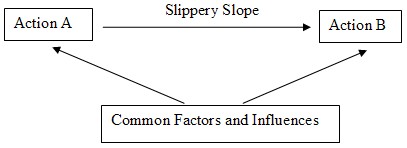Andrew Koppelman doesn’t mince words. “The constitutional objections [to health reform] are silly,” he writes. His paper is worth a read, though I doubt it’ll change anybody’s mind. For that reason, I have no interest in arguing the constitutionality question.
I cite Koppelman’s article so I can highlight my favorite part, which has broad application. It’s about the slippery slope argument, which I detest.
[One errs in] treating a slippery slope argument as a logical one, when in fact it is an empirical one.
Frederick Schauer [link] showed over 25 years ago that any slippery slope argument depends on a prediction that doing the right thing in the instant case will in fact increase the likelihood of doing the wrong thing in the danger case. If there is in fact no danger, then the fact that there logically could be has no weight. For instance, the federal taxing power theoretically empowers the government to tax incomes at 100%, thereby wrecking the economy. But there’s no slippery slope, because there is no incentive to do this, so it won’t happen.
In his article, referenced above, Frederick Schauer does not completely reject slippery slope arguments, but he does warn that they are overused.
Many slippery slope claims, whether in law or in popular discourse, are widely exaggerated. [… S]lippery slope claims deserve to be viewed skeptically, and the proponent of such a claim must be expected to provide the necessary empirical support. […] Any slippery slope argument relies at bottom on the empirical observation that rules alone cannot compel behavior.
In other words, the slippery slope has relevance only in instances for which it isn’t necessary. The government isn’t holding back from mandating broccoli consumption because there is no legislative precedent regulating an “inactivity.” It’s held back because there’s simply no incentive to mandate broccoli eating. If there were, Congress would have already considered it, or ought to. In that case, one need not appeal to a slippery slope, though one certainly could. That is, it’s superfluous.
If passage of broccoli and insurance mandates did relate, the relationship would not be a causal one. The connection would be through common factors that influence both, not as a matter of common legal justification, but as a matter of common motivation. That is, if an insurance mandate stands at the top of the slope and a broccoli mandate resides down the hill, what would cause the latter to become law isn’t that the former did first. To the extent they’re related, it’s via other routes (like both are part of a broader, common agenda).*
The figure below makes this intuitive (I hope). Cases for which slippery slope arguments seem to make sense rhetorically (as opposed to legally) are those for which the subsequent action (B in the figure) is demonstrably likely and shares some motivational features with the initial action (A in the figure). If A occurs, then one might say the slippery slope will lead to B. But the reason it leads to B is not really because of A, but because of the set of common factors and influences that motivate and, thereby, cause both A and B. Of course B might occur after A does. Many of the motivations for A and B are the same. One would make a similar argument about A if B had occurred first. The slope tilts both ways! A broccoli mandate would just as reasonably (or not!) set the stage for an insurance mandate. The only way that is possible is if there is no slope at all and we’re on level ground. That we perceive a slope is only due to a misapplication of causality.
Spread the word: as a device of political rhetoric, the slippery slope has been leveled.
* By email, Ian Crosby suggests that I’m really debunking the “camel’s nose under the tent” (or maybe it is the “foot in the door”) argument. Based on his critique, I’ve worked out the distinction between that and the slippery slope. To make it clear would require another post and another diagram. I probably won’t get to it, though I’m not sure. The qualitative conclusion doesn’t change: these arguments are good only rarely, if ever.



